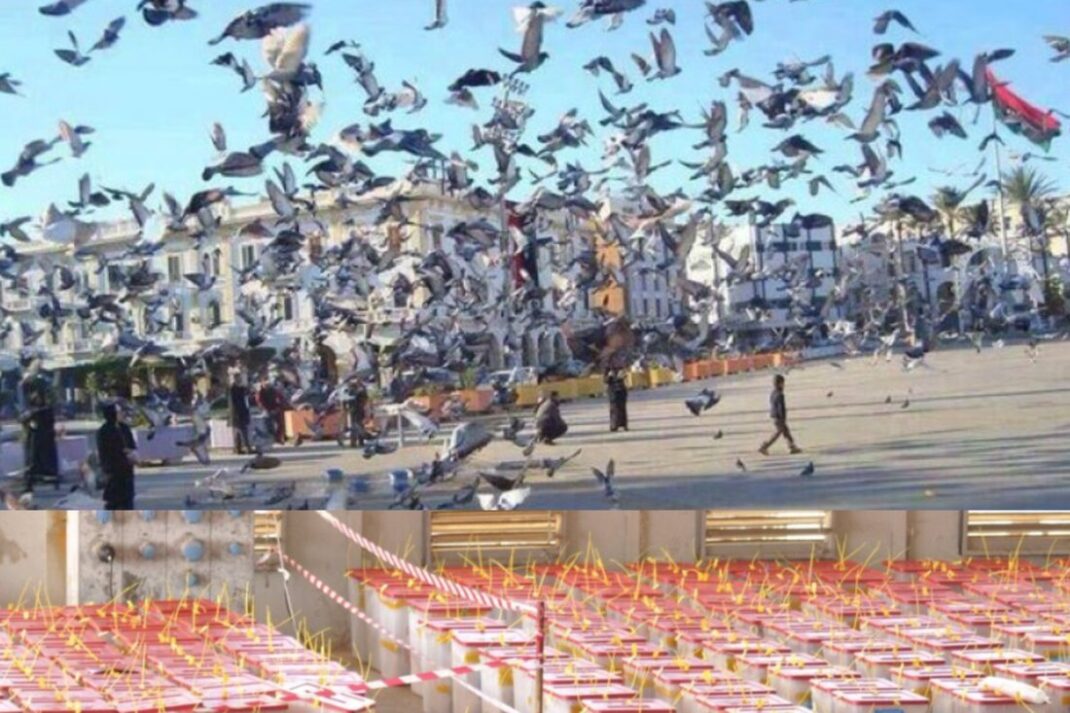HAFED AL-GHWELL

The world’s dizzying array of crises, from COVID-19 to climate change, intensifying great power rivalry, and even the US “rationalizing” its presence in the Middle East, may seem a disjointed assemblage of unfortunate coincidences. However, these seemingly endless woes are a symptom of a conspicuous interregnum in global geopolitics.
Competing ideologies among great powers, America’s receding hegemony, and growing rivalries among middle powers are perpetuating the enduring disorder across a highly fragmented global landscape. Developments in Ukraine and Syria highlight some of the complex and escalating interactions exacerbated by a worrying lack of will for cooperation. However, for an almost perfect microcosm of what this disordered era looks like, as well as what it could possibly lead to, we need not look further than Libya.
A decade ago, few could have predicted that the settling embers of Libya’s brief civil war were not the much-anticipated respite after four decades of authoritarianism, but the beginning of a tumultuous period, fraught with instability, chaos and eventually, a return to arms. Revolutionary fervor and aspirational democratic ideals swiftly crumbled to the narrow ambitions and lesser instincts tied to the mercurial tendencies of ascendant political and military figures.
Eventually, the failure of the democratic transition and Libya’s collapse will prove too attractive for malign interests, eyeing the North African country’s hydrocarbon endowments, proximity to Europe, proliferation of small arms, and ease of access into the perennially unstable Sahel. The end result is a strategic and moral failure by self-entitled promoters of democracy and stability, for failing to impose punishing costs on those still inciting Libya’s troubles.
Western policymakers and pundits take comfort in narratives or discourse about the post-Qaddafi era, focusing on the inevitability of numerous challenges given limited institutional capacities, and the regime’s tendency to monopolize the levers of power. However, talk of “inevitability” is just a reductive exercise designed to absolve external powers of their role in Libya’s woes.
Between Europe and the US, a pervasive lack of will has always clouded policies, responses, critical diplomatic engagements, and other much-needed interventions in Libya. Even the run-up to the NATO-led campaign, Operation Unified Protector, was rife with ambiguity, division and suspicion among Western allies, dooming any chances for coherent, collective actions to safeguard incremental progress toward a democratic transition.
The response, so far, has been to host a dozen different conferences and high-level summits where participants eagerly project mutual agreement but avoid implementing mechanisms to police their compliance. Thus, while all external actors, for instance, agree to withdraw thousands of foreign fighters and mercenaries, or acquiesce to the international arms embargo, none have turned curated declarations into action.
It is emblematic of this “new” era of incoherent diplomacy, and waning international cooperation, not helped by severely weakened global institutions. It is unsurprising, therefore, to witness an obsession with shambolic elections to cap off a transition marred by a decade of collective failures.
Libyans would be wise not to place all their hopes in an election highly touted by the international community as the panacea to a decade of ills.
It is unclear what the international community expects at the conclusion of the December polls, especially when Libyans themselves — despite their enthusiasm — do not seem to understand what their votes will entail. So far, debates are focused on the mechanisms surrounding the elections, such as who gets to set electoral law or determine the eligibility of candidates — not the ideas of presidential hopefuls, nor what the results will mean after December.
What is clear among the international community, however, is that ineffectual engagement on Libya will continue even if the elections fail to deliver the promised next phase of a stable, democratic transition. After all, with Western diplomacy itself having become a victim of the tribalization of politics, societies, and cultures after 2016, there is little hope for a sea change in reordering international engagement towards greater multipolarity.
Instead, narrow insular factions, exhausted or overwhelmed by complex multipolar engagements, have left their mark. As a result, Western governments, fearing political backlash are susceptible to quick fixes and ambivalence, abandoning the nuance, and enduring consistency foundational to effective foreign policy. As a result, the pursuit of very narrow objectives is now driving decision-making far more than the need to rise and meet the urgency of the moment, which demands collective action on shared interests.
Among the middle powers engaged in Libya, on the other hand, the struggle to set the terms of Libya’s transition has actually been a boost to their divergent interests. After all, a fully democratic and sovereign Libya would be highly resistant to projections of power by, or the ideological designs of external actors within its borders. In addition, this almost permanent state of flux also ensures that rival interests or actors cannot decisively influence Libya’s political developments either.
The result is a vested interest in maintaining the status quo, even though it promotes disorder, especially in cases where actors willingly flout international norms, and shun confidence-building measures sought by the global community to restore Libya’s stability. Unfortunately, neither the US nor China, the two most-powerful countries in the world, perceive their interests as threatened enough to try and re-order global engagement on just about everything from climate change to Libya. In Europe, on the other hand, while core interests and ideological positions are at risk should Libya implode, no leader has so far been able to navigate internal agreements, and spearhead a coherent response.
Furthermore, for Libya’s regional neighbors that can credibly claim they are threatened by its perpetual instability, neither Algeria, Egypt or Tunisia are capable of leading or coordinating any meaningful intervention. All three countries still carry visible scars of the Arab Spring, which are still the basis of their responses to Libya’s insecurity.
Worse yet, their attempts to insulate themselves from Libya’s woes or safeguard their interests have only impacted its evolving dynamics in destructive ways. Thus, the only recourse for ineffective unilateral interventions was multilateral diplomacy, but there is simply no appetite on the world stage for grand coalitions in pursuit of Libya’s stability, despite pronouncements to the contrary.
Libyans would be wise not to place all their hopes in an election highly touted by the international community as the panacea to a decade of ills. Foreign engagement itself in Libya remains ambiguous, divergent, and destructive, exacerbated by severely weakened global institutions in a fragmented world.
***
Hafed Al-Ghwell is a senior fellow with the Foreign Policy Institute at the John Hopkins University School of Advanced International Studies.
___________________





